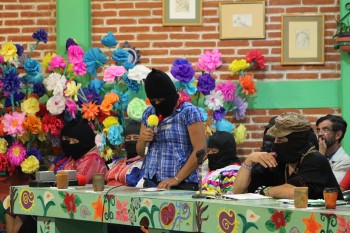Compañera base of support Lizbeth – 6 May 2015

Listen here: (Descarga aquí)
Words of Compañera Lizbeth, Zapatista base of support77
Good evening compañeros and compañeras, brothers and sisters.
We are going to explain a little bit of how we have been living and doing our autonomous work after the 1994 armed uprising.
We as Zapatista youth today, we are no longer familiar with the overseer, with the landowner, with the hacienda boss, much less with El Amate [a prison in Chiapas]; we do not know what it is to go to the official municipal presidents so that they can resolve our problems. Thanks to the EZLN organization, we now have our own authorities in each community, we have our municipal authorities, and our Juntas de Buen Gobierno [Good Government Councils], and they resolve whatever type of problem that might arise for a compañera or compañero, for both Zapatistas and non-Zapatistas.
We now have freedom and rights as women, to have opinions, discuss, and analyze, which is not how it was before, as the other compañera said.
The problem we still have is that we are shy about participating or explaining how we are working, but we compañeras are in fact doing the work.
Also, we women are already participating in all types of work, such as in the area of health, doing ultrasounds, laboratory work, pap smears, colposcopies, dentistry, and clinic work. We also participate in what we call the three areas, which includes midwifery, bone-setting, and medicinal plants.
We are also working in education as formadoras [teacher trainers] and coordinators, and education promotoras [like a teacher, literally “promoter”].
We have women broadcasters and members of the Tercios Compas [Zapatista media team].
We participate in compañera collectives, in women’s gatherings, and youth gatherings.
We are also participating as municipal authorities, which includes many different kinds of work, and we women do these tasks. We are also working in the Juntas de Buen Gobierno as local authorities, and as board members for the compañeras’ businesses.
In different autonomous work areas, we are already participating alongside our compañeros. Although we as young women don’t know how to govern yet, we are named to be community authorities because they see that we know how to read and write a little bit, and then we learn the rest through doing the work.
In the majority of the work that we carry out we are all young women, and we can tell you clearly that this work is hard, it is not easy. But if we have the courage to struggle, we can do these tasks where the people rule and the government obeys.
Now, men and women practice this form of struggle and of government every single day. We now see this as our culture.
That is all I wanted to say, compañeros and compañeras.
See also the full coverage of the Seminar “Critical thought vs. the Capitalist Hydra,” 3-9 May 2015.


